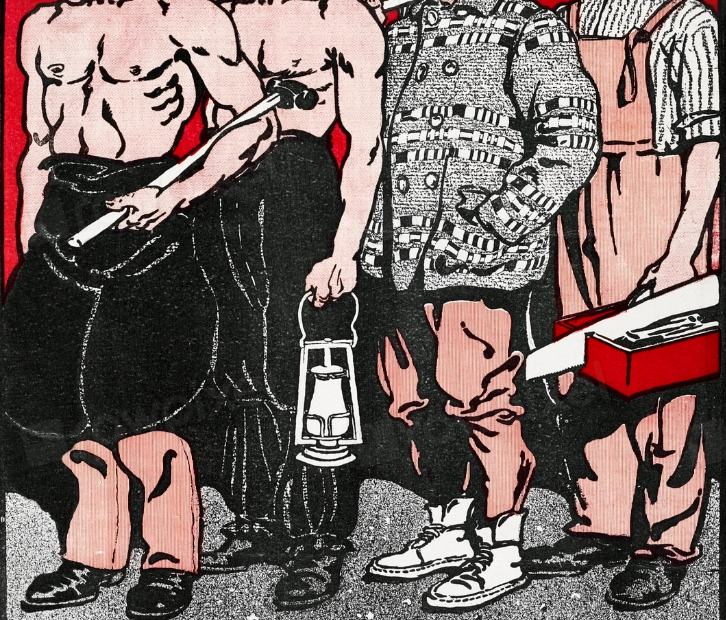President Trump, for his supporters and detractors alike, is a kaleidoscope, reflecting and refracting the greatest hopes and greatest fears of the beholder. In one light, he is the ultimate (white) Nationalist Hero, defending our nation from hordes of immigrants. In another, he is the great Business Man, granting billions in tax cuts to the wealthiest Americans, all to restore some prosperous economy of yesteryear (1980s? 50s?). For his detractors, he is a strongman authoritarian, Mussolini born again. Or maybe he’s a dopey man-child, destroying what’s left of the social safety net in a temper tantrum. There is a projection of Trump for every faction of Americans, but all of these projections are united by a common theme: Trump is a Man.
This cartoonish image of masculinity has spread across our politics and culture. It enabled the cult following and appointment of fit, but not exactly healthy, RFK Jr to the Department of Health where he hopes to ban mifepristone. It is the one that prompted intense fixation on a year-old TikTok from an Australian skincare brand from men who saw in these women a symbol of everything wrong with the world: incompetent female HR directors refusing to hire men for decent jobs, turning the workplace into another backdrop for narcissistic social media posting, while men languish at their computers with no romantic prospects. And it is the image of masculinity that inspired Tucker Carlson to compare America to a “bad girl” about to get “a vigorous spanking” from “daddy.” For a loud and highly motivated contingent of Trump’s base, gender-based grievance motivates the frothing support for Trump, prompting the liberal media establishment to take notice and ask, repeatedly, frantically: “What do we do about men?”
For feminists, the question is exasperating. It implies that liberals must slide to the right to appease young men dreaming of a “retvrn” to a world that only ever existed in coffee commercials: beautiful women dressed in flattering but modest dresses, floating around immaculate homes, high on loving devotion for their husbands and children. If we give these men what they want, it would clearly come at a great expense to women. They want to return to a culture of universal veneration of masculinity, to remove women from the workforce and pressure them to get married early and become mothers to large broods of children. In our wildest fears, these men would institute state-mandated girlfriends, as Jordan Peterson has suggested.
Like what you read? Support our work by subscribing to our Patreon for free or as a supporter.
While this vision of the future is so absurd, reactionary, and ridiculous that no reasonable person would ever buy into it, it is a compelling fantasy for a not insignificant population of men. This is not a conversation feminists can afford to cede. The question then, is the same, but taken on our own terms: What do we do about men?
WE NEED A NEW TACK
Contrary to accusations the “woke” rhetoric of feminism “went too far” and pushed men to the right, the real causes of misogyny are material, rooted in men’s experiences, desires, ideals, all shaped by the expectations they grew up with and the world they loathe to exist in today. The new movement of Men’s Rights Activists (who by and large, wisely, don’t use that label) blame DEI and a society made soft by appealing to female sensibilities that clashes with men’s biological and spiritual need for hard work, glory, and early death. Unfortunately, mainstream feminist thinking falls into a mirrored version of this framing.
Feminist criticisms often emphasize moral failing in men to resist the sway of the alt-right, and reject explanations pointing to male loneliness or economic precarity as pitiful excuses for misogyny. Thus the only acceptable narrative is that men (perhaps due to their essential nature) are too tempted by patriarchal power to ever give up misogyny. But if that’s the case, there is no changing men and all this energy directed toward complaining about it is basically pointless. This is not going to get us anywhere.
The point of finding the reasons misogyny exists is not to assign moral blame, it’s to understand how to change it. “Men are more reactionary in part because they are lonely” is not a call to individual women to fix this loneliness. It’s certainly not a call to date incels or to “give nice guys a chance.” The reality that a lot of men are alienated and lonely is something we must address because it has consequences for all of us. “Men are lashing out because their economic prospects keep them from living up to what they believe it means to be a man” does not suggest women should tolerate misogyny or mistreatment. It is another important factor to recognize if we’re going to achieve liberation for women.
I don’t blame feminists at all for expressing outrage and dismay at the seemingly intractable problem of widespread misogyny, growing even among the younger generations, who some thought would bring us into a progressive future. I share their frustration and grief. I don’t even blame them for ignoring or discarding these men as lost causes. But this doesn’t even begin to point us in the direction of how to address the issue. We need to understand that it’s not random that these sentiments are catching on so much right now among young men. These ideas have been around and easy to access for a long time, but there are reasons that have led men who otherwise would have gone on to have the passive, unexamined misogyny of a typical man to now become radicalized into an Andrew Tate-style intense hatred of all women. What caused this shift?
One mainstream feminist explanation for this radical shift is simple reaction: men correctly perceive that the past decades of women’s encroachment into men’s domains and increasing economic power have left men without the leverage of past decades. They were promised a mother/bangmaid/secretary/housewife and instead got women who expect equal contributions to the household. This idea is not without merit, but it’s also an incomplete story.
MISOGYNY AND ECONOMICS AS A SEXUAL STRATEGY
Precarity brings out the worst in human nature. While the very wealthy have always been funders of fascism, it’s not for them. Fascism distracts the masses of precarious and dissatisfied workers from solutions that affect the position of those very wealthy people. Racism, sexism, nationalism all rise when people who have come to expect upward mobility and prosperity find it slipping away. In the current American economy there are no reliable paths to prosperity. Now only around 50% of children can expect to outearn their parents compared to 90% born in the 1940s, and recent generations have felt advice for success shift from “just go college” to “just go to law school” to “just major in computer science,” without a clear sense of where to go now that the tech jobs are becoming more sparse. Young men and women alike are drawn to get rich quick schemes, gambling, influencing and streaming, and fringe ideologies, all of which offer bold, but illusory promises of financial gain.
This is no doubt a part of the picture, but it would be misplaced to argue the relationship between class and sexism, a primeval entanglement, works only in one direction. As Engels once argued in The Origin of the Family, Private Property and the State, sexism grew out of the early need of resource-wealthy men to ensure their spoils went to their own progeny. This incentive for control of women’s sexuality spawned increasingly complex and psychologically all-encompassing ideologies of gender: roles, ideals, archetypes, and systems of direct violence like domestic abuse, rape, sex trafficking and indirect violence like, social shame, discrimination, beauty standards violence. This sprawling system of control was all used to enforce gender norms. The most insidious aspect of it all was that none of it required conscious, intentional enforcement, only fear of the “consequences” of unregulated female sexuality.
Women’s entry into the workplace, their subsequent advances against wage discrimination and unfair labor practices thanks to unions and socialist feminists, and their ability to make an independent wage fundamentally disrupted many of these systems of control, and the ideologies they upheld. It became more difficult to suggest a fundamental inability for women to do certain kinds of work when they were being paid to do it, or to keep women under surveillance in the home when they could afford to take themselves out.
This disruption did not escape the notice of conservative men, who often even openly acknowledge that the reason they don’t like women working is because they want women to be financially dependent on men. Most men are not so pathological and seem very content to enjoy the benefits of a dual-income relationship, and a partner who amounts to much more than a dependent and subservient extension of themselves. But unfortunately, conservatism among men abounds.
Misogyny then, especially control, has a close relationship with economics. A worsening (perceived or real) of men’s economic circumstances and/or an improvement (perceived or real) in women’s economic circumstances can intensify misogyny in the resentful, disempowered men, who feel that they have lost the manliness that comes from material success and denied the social success of association with attractive women.
We also can’t overlook the role of the internet in giving shape and direction to the vague, somatic angst of alienated men. Andrew Tate, now facing charges of rape and human trafficking, is just the tip of the iceberg. Even though the X, The Everything App must know I’m a woman given the number of tweets it shows me about the luteal phase, it shows me countless posts designed to tell men some version of the same things: women have it easy, women have no sense of responsibility, women want to take away your fun, women prefer men who are taller than you, women prefer men from other races, women have lost their feminine, nurturing nature, women have lost their sexual allure, women will sleep with other men but not you (oops, wrong link), women will take your money, women will trick you into raising another man’s child. I can only imagine what the actual targets for this content are seeing. In a culture where fewer and fewer people have friends in the real world, the terrible nightmare world the internet shows the morbidly depressed and lonely feels more and more real to them.
A stark rise in economic precarity, the ongoing liberation of women, and worsening alienation for men and women alike have primed men to be radicalized by social media feeds that incentivize whatever gets the most attention, even if it’s untrue and unhealthy. We cannot accept this as the new paradigm of masculinity. Doing so not only means losing a generation of men to a vile ideology, but subjecting another generation of women to abuse.
THE WAY FORWARD
Any strategy to address misogyny requires two prongs: the implementation of economic and social policies to promote the success and well-being of all and a society in which women are able to safely escape and fight the misogyny of romantic partners, employers, fathers, and other men. While increased prosperity without a larger cultural shift away from misogyny will not forward the goal of gender equality, there is little room for cultural change without a substantial change in the economic situations of working men and women. Additionally, since sexism is a vital tool of the wealthy to maintain their power, increased prosperity will require a shift away from sexism. The cultural and economic go hand in hand.
An ideal society that wanted to eliminate sexism would remove the economic dependence of women (and men) on their partners and employers so things like healthcare, a place to live, basic sustenance, were no longer only accessible by employment, marriage, or independent wealth. Any steps to create a safety net for all people work towards this ideal, and any steps that give more power and agency to the working class bring us closer to actually realizing this ideal in a way that isn’t subjected to the whims of the ruling class.
Organizing the people who would benefit from the democratization of the workplace and the end of precarity (working class men and women, Australian skincare employees alike), into political groups that can organize for their interests and into unions which can directly pressure for better working conditions is crucial to the goal of women’s liberation, and to men’s as well. The Equal Pay Act could not have been won without years of agitation from labor feminists pushing for the same protections in unions, and it was unionized women who won the right to maternity leave and other workplace reforms enabling more balance between their paid wage labor and the unpaid labor at home. While on the whole, the prosperity won by unions depleted the fertile ground of fascism. Perhaps unionized women today could help deliver to America the long parental leave enjoyed by many other countries, helping to balance the load of domestic and child-rearing tasks, giving men and women more time with their families, and perhaps most importantly uniting them in shared struggle for a mutually imagined future.
Ending misogyny, even this surging virulent form, is not as simple as any sets of policies, or the immediate effects of economic equality. It is deeply ingrained in the culture, and while it may be dormant or less overt in times of prosperity, the roots will take much longer to destroy. These roots are also impediments to the willingness of many men to see women as allies in the improvement of their lives, and the preponderance of this kind of misogyny in men makes some women reluctant to organize with them in turn. The road will require more trust than any individual deserves, but it’s the only way out.
Zohran Mamdani’s blowout victory in his democratic primary run for mayor over Andrew Cuomo (a serial sexual harasser who like Trump forwarded a macho, strong man persona) and in particular his high support from men, especially young men, shows the power of this kind of solidarity-based politics to change the cultural landscape. Many of the same demographics that Trump won in 2024 went for Mamdani in the democratic primary; this is not a matter of committed bigots, but a result of a political imagination that has been, until very recently, constrained.
Socialists, and anyone else invested in building a better world, cannot afford to write-off so many people whose interests are fundamentally aligned with our own. It’s clear some men have radicalized beyond hope of working with, befriending, or loving women, and from whom women need protection. But the average man, currently told his best interest is in denigrating women while he suffers a poor paying job and isolation, could be told instead that he could have his basic needs met, could find some dignity and healthy pride through working in a community for a shared cause, could see the ways in which working alongside women is more satisfying than trying to dominate them, could perhaps also liberate himself along the way.


